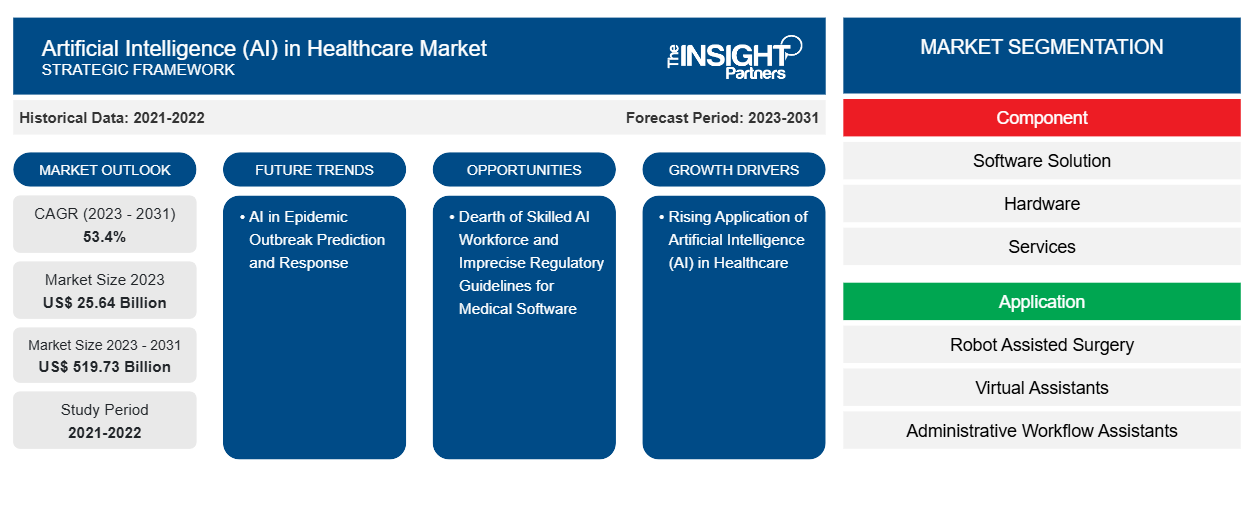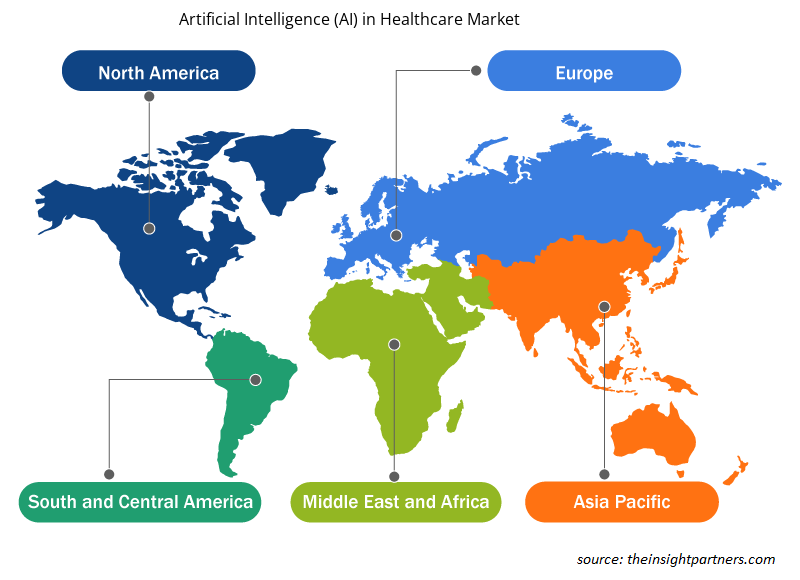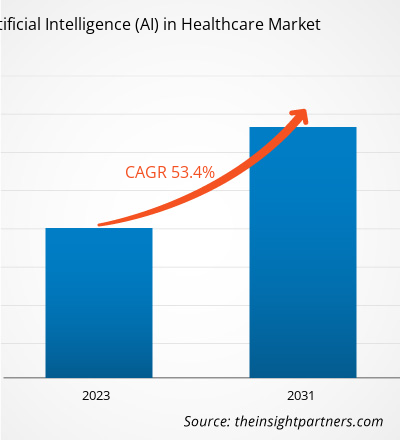The artificial intelligence (AI) in healthcare market size is projected to reach US$ 519.73 billion by 2031 from US$ 25.64 billion in 2023. The market is expected to register a CAGR of 53.4% during 2023–2031.
Development of AI‐powered autonomous service robots, humanoid robots, real-time disease monitoring, analysis and visualization of spreading trends, an estimate of infection rate and infection trend, and rapid decision‐making to identify effective treatments are likely to remain key trends in the artificial intelligence (AI) in healthcare market during the forecast period.
Artificial Intelligence (AI) in Healthcare Market Analysis
The increasing influx of large and complex healthcare data sets drives the artificial intelligence (AI) in healthcare market. In addition, there is an increasing need to simultaneously reduce healthcare costs and increase computing power by minimizing hardware costs. Furthermore, the market is fuelled by growing government initiatives and their collaboration to promote the implementation of AI in healthcare and increasing mergers and acquisitions and portfolio expansions by market players. There is an imbalance between health workers and patients. Artificial intelligence restores this balance and drives the artificial intelligence (AI) in healthcare market growth. The increasing use of precision medicines and clinical trial processes requires AI, further driving the market. Increased funding for research and development in this area contribute to the artificial intelligence (AI) in healthcare market growth.
Artificial Intelligence (AI) in Healthcare Market Overview
AI has various applications in healthcare. It allows doctors to retrieve information, interpret images captured during scans, and make treatment plans. In addition to the clinical aspect, AI is beneficial in research activities. Advances in medicine, supported by advances in public health, innovation, research, and technology, significantly reduce morbidity and mortality. The healthcare sector is evolving significantly by leveraging AI to boost productivity while reducing the enormous burden on healthcare professionals. Government and private organizations incorporate AI into their research efforts to accelerate development.
Customize This Report To Suit Your Requirement
You will get customization on any report - free of charge - including parts of this report, or country-level analysis, Excel Data pack, as well as avail great offers and discounts for start-ups & universities
Artificial Intelligence (AI) in Healthcare Market: Strategic Insights

- Get Top Key Market Trends of this report.This FREE sample will include data analysis, ranging from market trends to estimates and forecasts.
You will get customization on any report - free of charge - including parts of this report, or country-level analysis, Excel Data pack, as well as avail great offers and discounts for start-ups & universities
Artificial Intelligence (AI) in Healthcare Market: Strategic Insights

- Get Top Key Market Trends of this report.This FREE sample will include data analysis, ranging from market trends to estimates and forecasts.
Artificial Intelligence (AI) in Healthcare Market Drivers and Opportunities
Increasing Cross-Industry Partnerships and Collaborations
Cross-industry partnerships are resulting in the introduction of new machine learning (ML) models that predict risk and provide cognitive assistance. The partnerships are among the most dynamic practices in corporate and society relations that bridge various sectors, such as public, private, and nonprofit. In October 2023, Siemens and Microsoft partnered to advance the adoption of AI across industries. The companies are introducing Siemens Industrial Copilot, a jointly developed AI-powered assistant to improve human-machine collaboration in manufacturing. Additionally, the integration of Siemens Teamcenter product lifecycle management software and Microsoft Teams would pave the way for the further development of the industrial metaverse. In January 2023, AstraZeneca collaborated with Qure.ai, a developer of deep-learning algorithms for interpreting radiological images. The collaboration will specifically focus on overcoming barriers that limit access to diagnostic tools, supporting early detection of lung cancer, reducing mortality rates, and improving patient outcomes, particularly in low- and middle-income countries.
Rising Potential in Emerging Economies
In developing countries where access to medical technology, medical professionals, and resources is limited, the impact of AI applications is likely to provide a disruptive path to solving current major challenges. For instance, researchers at the Indian Institute of Technology (IIT), Delhi, developed an AI-powered system to diagnose tuberculosis (TB) using chest X-rays. The system can analyse X-rays for signs of tuberculosis in less than a minute, making it a valuable tool for diagnosing tuberculosis in remote areas where access to healthcare professionals may be limited. In Brazil, there is a shortage of dermatologists in most cities, even in the outskirts of large cities. Top hospitals are narrowing access gaps by offering teledermatology services powered by AI screening tools. Further, the use of AI technology can reduce the cost of healthcare and make it affordable for people in developing countries.
Artificial Intelligence (AI) in Healthcare Market Report Segmentation Analysis
Key segments that contributed to the derivation of the artificial intelligence (AI) in healthcare market analysis are component, application, and end user.
- Based on component, the artificial intelligence (AI) in healthcare market is segmented into software solution, hardware, and services. The software solution segment held the largest market share in 2023.
- By application, the market is segmented into robot-assisted surgery, virtual assistants, administrative workflow assistants, connected machines, diagnosis, clinical trials, fraud detection, cybersecurity, dosage error reduction, and others. The robot-assisted surgery segment held the largest share of the market in 2023.
- In terms of end user, the market is segmented into hospitals & healthcare providers, patients, pharma & biotech companies, healthcare payers, and others. The hospitals & healthcare providers segment dominated the market in 2023.
Artificial Intelligence (AI) in Healthcare Market Share Analysis by Geography
The geographic scope of the artificial intelligence (AI) in healthcare market report is mainly divided into five regions: North America, Asia Pacific, Europe, the Middle East & Africa, and South & Central America.
North America dominated the artificial intelligence (AI) in healthcare market. The market growth in North America is attributed to the evolving digital infrastructure in healthcare, the well-established healthcare sector, and rising patient awareness regarding the benefits of AI. The artificial intelligence (AI) in healthcare market in North America is also likely to spur with the presence of various key players in the market. In addition, the adoption of digital tools in healthcare operations for improving quality and reducing costs contributes to the dominance of North America in the artificial intelligence (AI) in healthcare market. Asia Pacific is anticipated to register the highest CAGR in the coming years.
Artificial Intelligence (AI) in Healthcare Market Regional Insights
The regional trends and factors influencing the Artificial Intelligence (AI) in Healthcare Market throughout the forecast period have been thoroughly explained by the analysts at The Insight Partners. This section also discusses Artificial Intelligence (AI) in Healthcare Market segments and geography across North America, Europe, Asia Pacific, Middle East and Africa, and South and Central America.

- Get the Regional Specific Data for Artificial Intelligence (AI) in Healthcare Market
Artificial Intelligence (AI) in Healthcare Market Report Scope
| Report Attribute | Details |
|---|---|
| Market size in 2023 | US$ 25.64 Billion |
| Market Size by 2031 | US$ 519.73 Billion |
| Global CAGR (2023 - 2031) | 53.4% |
| Historical Data | 2021-2022 |
| Forecast period | 2023-2031 |
| Segments Covered |
By Component
|
| Regions and Countries Covered | North America
|
| Market leaders and key company profiles |
Artificial Intelligence (AI) in Healthcare Market Players Density: Understanding Its Impact on Business Dynamics
The Artificial Intelligence (AI) in Healthcare Market is growing rapidly, driven by increasing end-user demand due to factors such as evolving consumer preferences, technological advancements, and greater awareness of the product's benefits. As demand rises, businesses are expanding their offerings, innovating to meet consumer needs, and capitalizing on emerging trends, which further fuels market growth.
Market players density refers to the distribution of firms or companies operating within a particular market or industry. It indicates how many competitors (market players) are present in a given market space relative to its size or total market value.
Major Companies operating in the Artificial Intelligence (AI) in Healthcare Market are:
- NVIDIA Corporation,
- Nuance Communications, Inc.,
- Microsoft,
- General Electric Company,
- Intel Corporation,
- Alphabet Inc.,
Disclaimer: The companies listed above are not ranked in any particular order.

- Get the Artificial Intelligence (AI) in Healthcare Market top key players overview
Artificial Intelligence (AI) in Healthcare Market News and Recent Developments
The artificial intelligence (AI) in healthcare market is evaluated by gathering qualitative and quantitative data post primary and secondary research, which includes corporate publications, association data, and databases. A few of the developments in artificial intelligence (AI) in healthcare market are listed below:
- Bayer and Google Cloud announced a collaboration on the development of AI solutions to support radiologists and ultimately better serve patients. As part of the collaboration, Bayer would develop its innovation platform to accelerate the development and deployment of AI-powered healthcare applications with a clear focus on radiology, using Google Cloud's technology, including its generative AI (gen AI) tools. The collaboration aims to help organizations overcome many of the challenges to building scalable and compliant AI-powered medical imaging software products using leading data security capabilities and accelerate the development of potentially groundbreaking and impactful solutions that ultimately benefit patients. (Source: Google Cloud, Press Release, 2024)
- OM1 launched PhenOM, an AI-powered platform for personalized medicine. Calibrated using OM1’s longitudinal health history datasets, PhenOM uses AI to identify unique digital phenotypes associated with conditions and outcomes and compare patients’ records to highlight risks and opportunities. PhenOM powers personalized healthcare insights at scale across the entire healthcare ecosystem, from life science research to point-of-care clinical decision making. (Source: OM1, Press Release, 2023)
- Responding to rapid advances in AI and the urgent need to define its responsible use in health and medicine, Stanford Medicine and the Stanford Institute for Human-Centered Artificial Intelligence (HAI) announced the launch of RAISE-Health (Responsible AI for Safe and Equitable Health). This pioneering initiative seeks to address critical ethical and safety issues surrounding AI innovation and help others navigate this complex and evolving field. (Source: Stanford Medicine, Newsletter, 2023)
- Google Cloud announced two new AI-powered life sciences solutions to boost drug discovery and precision medicine for pharmaceutical firms, biotech companies, and public sector organizations. Available across the world, the Target and Lead Identification Suite helps researchers predict the structure of proteins and identify the function of amino acids, and the Multiomics Suite accelerates the discovery and interpretation of genomic data, helping companies design precision treatments. (Source: Google Cloud, Press Release, 2023)
Artificial Intelligence (AI) in Healthcare Market Report Coverage and Deliverables
The “Artificial Intelligence (AI) in Healthcare Market Size and Forecast (2021–2031)” report provides a detailed analysis of the market covering below areas:
- Artificial intelligence (AI) in healthcare market size and forecast at global, regional, and country levels for all the key market segments covered under the scope
- Artificial intelligence (AI) in healthcare market trends as well as market dynamics such as drivers, restraints, and key opportunities
- Detailed PEST/Porter’s Five Forces and SWOT analysis
- Artificial intelligence (AI) in healthcare market analysis covering key market trends, global and regional framework, major players, regulations, and recent market developments
- Industry landscape and competition analysis covering market concentration, heat map analysis, prominent players, and recent developments for the artificial intelligence (AI) in healthcare market
- Detailed company profiles
- Historical Analysis (2 Years), Base Year, Forecast (7 Years) with CAGR
- PEST and SWOT Analysis
- Market Size Value / Volume - Global, Regional, Country
- Industry and Competitive Landscape
- Excel Dataset
- Parking Meter Apps Market
- eSIM Market
- Advanced Distributed Management System Market
- Online Exam Proctoring Market
- Electronic Data Interchange Market
- Barcode Software Market
- Maritime Analytics Market
- Cloud Manufacturing Execution System (MES) Market
- Robotic Process Automation Market
- Digital Signature Market
Testimonials
Reason to Buy
- Informed Decision-Making
- Understanding Market Dynamics
- Competitive Analysis
- Identifying Emerging Markets
- Customer Insights
- Market Forecasts
- Risk Mitigation
- Boosting Operational Efficiency
- Strategic Planning
- Investment Justification
- Tracking Industry Innovations
- Aligning with Regulatory Trends
Yes! We provide a free sample of the report, which includes Report Scope (Table of Contents), report structure, and selected insights to help you assess the value of the full report. Please click on the "Download Sample" button or contact us to receive your copy.
Absolutely — analyst assistance is part of the package. You can connect with our analyst post-purchase to clarify report insights, methodology or discuss how the findings apply to your business needs.
Once your order is successfully placed, you will receive a confirmation email along with your invoice.
• For published reports: You’ll receive access to the report within 4–6 working hours via a secured email sent to your email.
• For upcoming reports: Your order will be recorded as a pre-booking. Our team will share the estimated release date and keep you informed of any updates. As soon as the report is published, it will be delivered to your registered email.
We offer customization options to align the report with your specific objectives. Whether you need deeper insights into a particular region, industry segment, competitor analysis, or data cut, our research team can tailor the report accordingly. Please share your requirements with us, and we’ll be happy to provide a customized proposal or scope.
The report is available in either PDF format or as an Excel dataset, depending on the license you choose.
The PDF version provides the full analysis and visuals in a ready-to-read format. The Excel dataset includes all underlying data tables for easy manipulation and further analysis.
Please review the license options at checkout or contact us to confirm which formats are included with your purchase.
Our payment process is fully secure and PCI-DSS compliant.
We use trusted and encrypted payment gateways to ensure that all transactions are protected with industry-standard SSL encryption. Your payment details are never stored on our servers and are handled securely by certified third-party processors.
You can make your purchase with confidence, knowing your personal and financial information is safe with us.
Yes, we do offer special pricing for bulk purchases.
If you're interested in purchasing multiple reports, we’re happy to provide a customized bundle offer or volume-based discount tailored to your needs. Please contact our sales team with the list of reports you’re considering, and we’ll share a personalized quote.
Yes, absolutely.
Our team is available to help you make an informed decision. Whether you have questions about the report’s scope, methodology, customization options, or which license suits you best, we’re here to assist. Please reach out to us at sales@theinsightpartners.com, and one of our representatives will get in touch promptly.
Yes, a billing invoice will be automatically generated and sent to your registered email upon successful completion of your purchase.
If you need the invoice in a specific format or require additional details (such as company name, GST, or VAT information), feel free to contact us, and we’ll be happy to assist.
Yes, certainly.
If you encounter any difficulties accessing or receiving your report, our support team is ready to assist you. Simply reach out to us via email or live chat with your order information, and we’ll ensure the issue is resolved quickly so you can access your report without interruption.





















 Get Free Sample For
Get Free Sample For